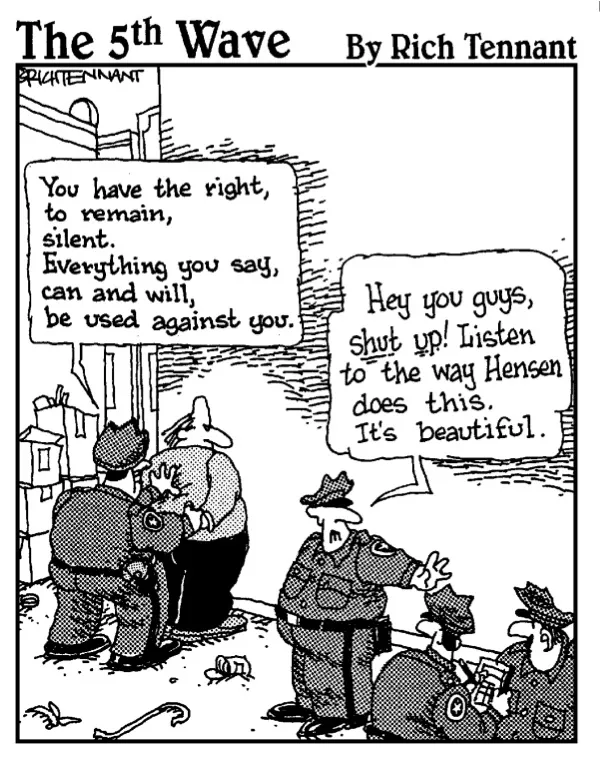In this part . . .
Chapter 1
Poetry 101
In This Chapter
Knowing what sets poetry apart from other words on a page
Reading poetry aloud — and knowing why you’re doing it
Creating your own poetry from scratch
The word poetry sends chills down the spines of many otherwise strong and balanced people. Perhaps you have flashbacks of being called on in class to read a poem aloud — and not having a clue what the words you were reading meant. Or maybe you remember being required to write a poem, and even today you’re still not exactly sure what sets a poem apart from any other bunch of words thrown onto a blank page. Or perhaps you’re just curious about poetry, but you’re intimidated by the huge number of poetry books in your local bookstore or library.
No matter what your past experiences with poetry have been, you can set your worries aside. To read and write poetry, you don’t have to join some secret club, where you have to wear a moose hat with antlers, stand on one leg, and recite secret ritual formulas in Greek . . . although, goodness knows, that would be quite interesting, and we’d be happy to watch if you volunteer.
Poetry is something human beings have always done and always loved. If you want to be one of them, come along. In this chapter, we give you a working definition of what poetry is and fill you in on why people have been writing it for thousands of years. We also let you know about some great places to turn if you want to read more poetry — and while we’re on the topic, we give you a quick guide for actually reading a poem. Finally, if all this talk about poetry has inspired you (and we sure hope it has!), you can dive right in and write a poem of your own.
What Is Poetry and Why Do People Write It?
Poetry is the practice of creating artworks using language. Sculptors use marble, steel, cardboard, goose liver pâté, whatever material they choose. Musicians use sound. Painters use paint. Furniture-makers use woods and fabrics. And poets use language.
So what makes poetry different from other uses of language? Here are five things almost all poetry has more of than other language (the non-poetic kind):
Attentiveness: Poets are extremely careful with the way they use language. They pay attention to everything from spelling to the way the words sound and what they mean. They think about punctuation and the spaces between and around words. Most people simply don’t pay as much attention to these elements of language — but paying attention is the poet’s job. And poets want
you to pay that sort of attention, too — to the language you read and use
and to your life.
Concentration: Poetry has more meaning, music, and emotion per word, per syllable, and per letter than other kinds of writing. Poets find ways to open up explosions of understanding and emotion — while using carefully selected combinations of words. More meaning, fewer words — a nice trick. Whenever you find language especially charged with passion, music, or significance, you’re probably looking at poetry or something close to it.
Experiment: Poets try to use language in as many new, surprising, and challenging ways as they can come up with. They use language in special ways to startle, awaken, or challenge you.
Originality: Poetry says or does something new; it makes something new happen in the reader’s mind. This new thing can be a totally original observation about life, or it can be a neat way of saying something many other people have already thought or said. Whatever it is, you can tell it’s original because it doesn’t try to echo someone else’s way of saying it — it finds its own way.
Form: Most people write from one margin across to the next. Sometimes they indent to show that a new paragraph is starting. But poetry is different: It’s very often about
form — the very shape or structure a particular group of words takes. The word
form also refer to the way a poem is written (its
mode). You can write a poem in the form of a prayer, a letter, a laundry list. And all forms carry their own worlds of meaning. So poets think a lot about form.
Poetry isn’t the only way of using language to make art, of course — for example, short stories and novels are works of art, too. But poetry usually has a greater degree of attentiveness, concentration, experiment, and form than you find in most other uses of language.
Poets are interested in exploring experience through the written word. That includes any experience you can have, as well as the world of your dreams and fantasies — the story of civilization; the taste of a peach; dancing with your father; imaginary worlds with imaginary inhabitants; sending your daughter off to college; leaving someone you...










